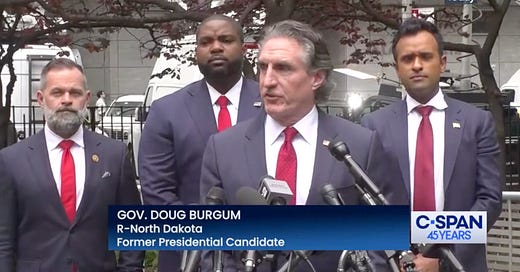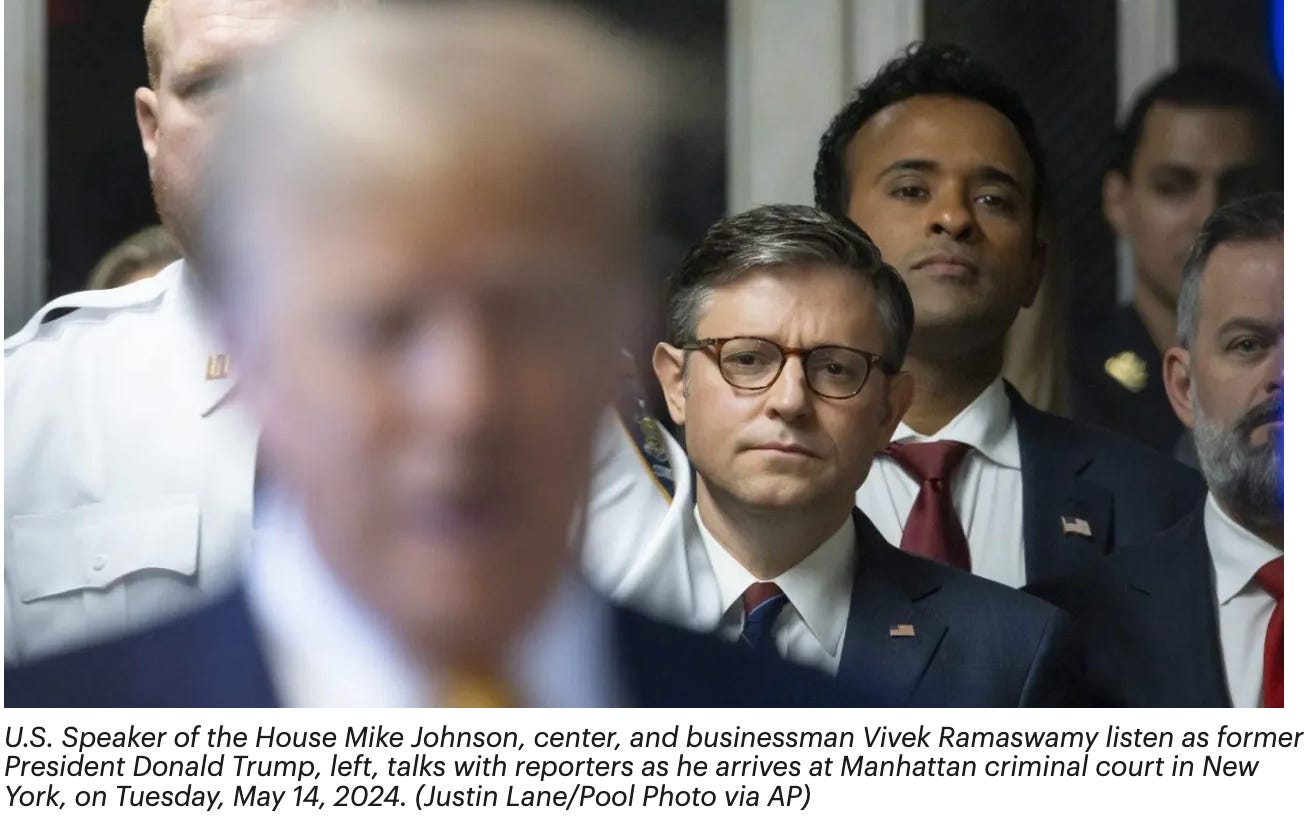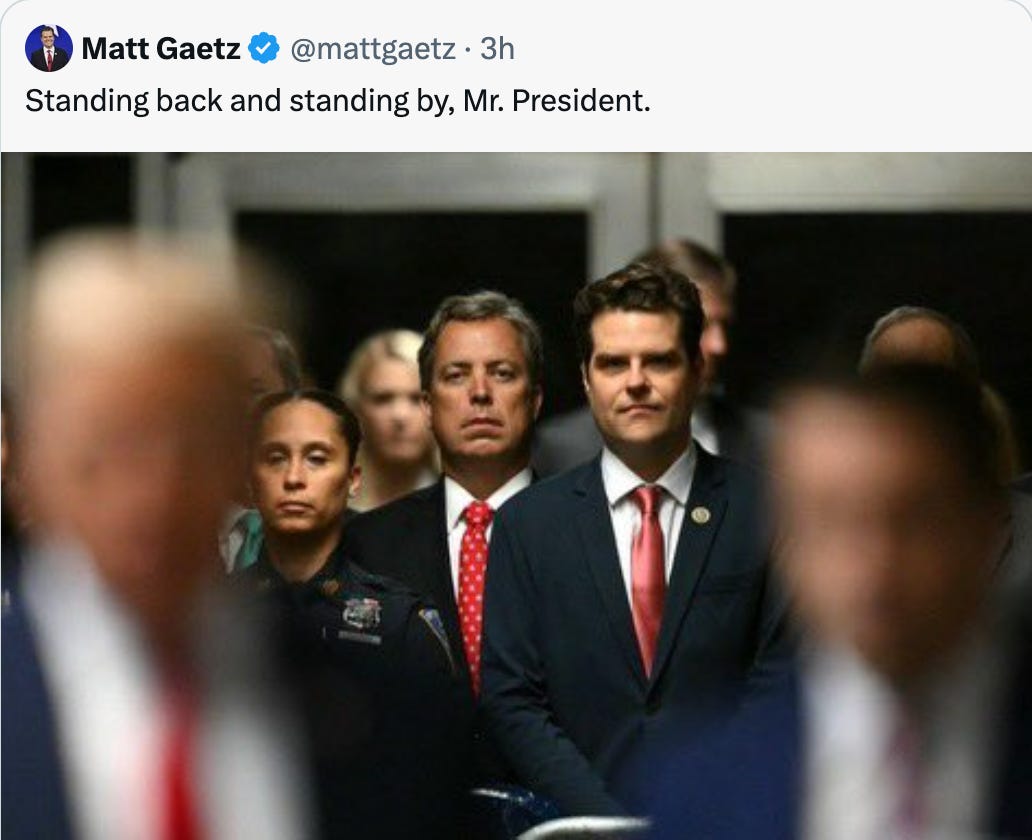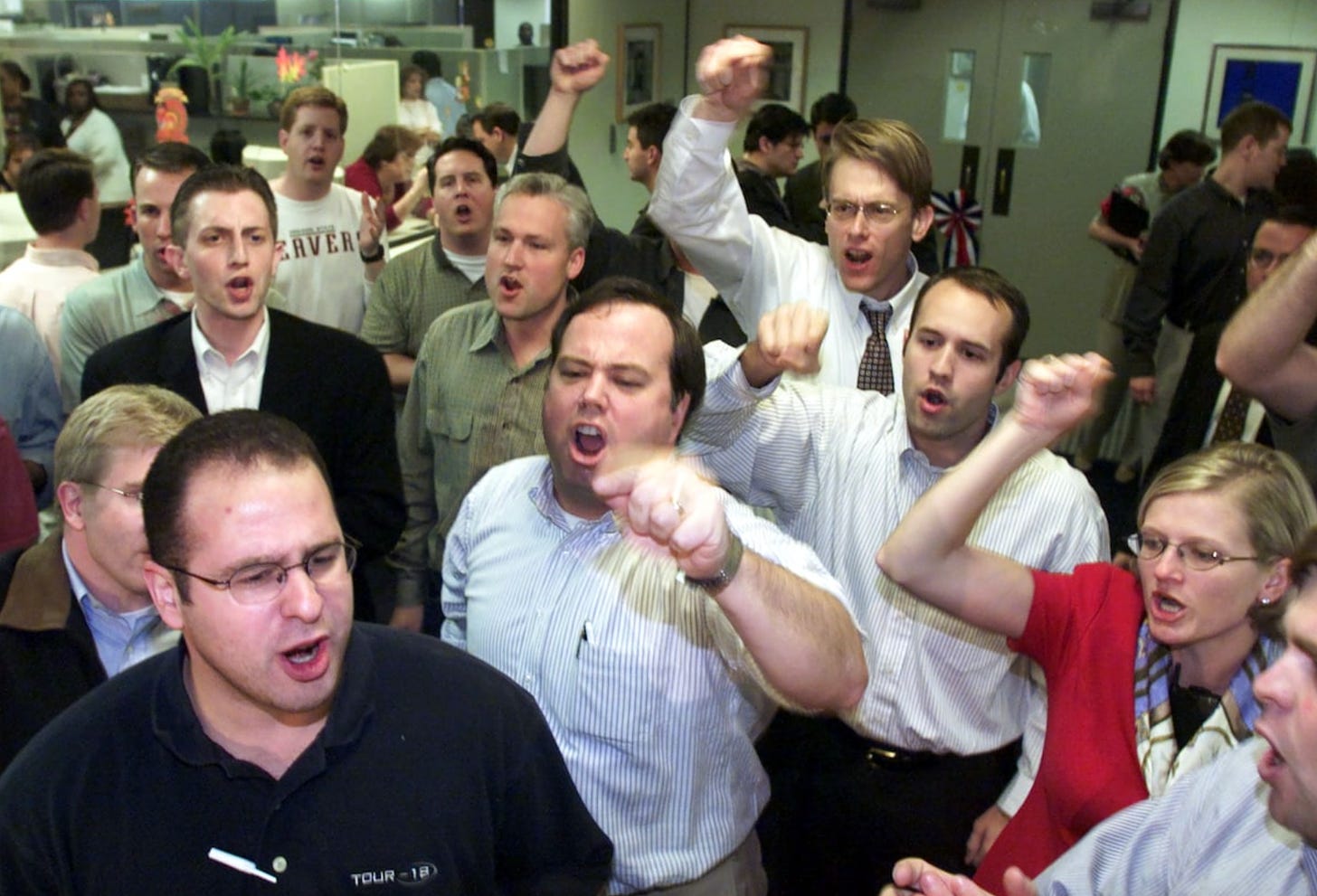Steve Biko, the anti-Apartheid activist once said “If you want to say something radical, you should dress conservative.”
Unfortunately, these are the guys who are taking Biko to heart.
The uniform of the most powerful anti-institutionalists in America today is a classic navy blue suit, white shirt, red tie, and flag pin. Here, Governor Burgum and other Republicans seeking to curry favor with Trump, went to New York to denounce a trial, calling it a “scam” and a “sham.” They join other Republicans who argue that the rule of law has been weaponized, that the FBI must be defunded.
It turns out that you can assault the criminal justice system and the rule of law, and call for defunding the police, as long as you are well dressed. Wear the right suit, and suddenly a phalanx of microphones appears. The cops are their to protect your criticism, not pepper-spray you.
It was not just cheap talk. Tommy Tuberville acknowledged that the parade of perfectly coiffed Republicans were there to help Trump subvert a gag order against threatening the judge and his daughter, part of a wider pattern of intimidating judges involved in Trump cases.
Speaker Mike Johnson arrived to declare the court system as “corrupt.” The Associated Press stood out in providing some context for how radical these sentiments are:
It was a remarkable moment in modern American politics: The House speaker amplifying Trump’s defense and turning the Republican Party against the federal and state legal systems that are foundational to the U.S. government and a cornerstone of democracy.
Imagine a range of others potential speakers who might convey this message. What if an anti-prison advocate, concerned by sentencing disparities, labeled the system as corrupt. Or a bearded lefty professor (leaning heavily on the stereotypes, I know), suggested that prosecutions targeted the most vulnerable. To what degree would their views be dismissed as radical or fringe? Indeed, a critique of college campuses is that they indoctrinate students into such radical notions that they undermine core beliefs necessary to maintain the civic trust needed for the American experiment to succeed. But is any classroom in America remotely as anti-institutionalist as the messaging from the contemporary Republican Party?
For example, Matt Gaetz reiterated Trump’s call upon the Proud Boys, a right-wing hate group that played a central role on the attack on the Capitol and effort to overturn the last election, to “stand back and stand by.”
Quick thought experiment: imagine the protestor below saying he refused to accept the result of the most recent election. He might support future election outcomes, he says, but only if they met his definition of a “free and fair” election. In any case, there was no reason to worry that his candidates would not win.
Can we tolerate such anti-democratic views in America?
Of course we can. It has become normalized. The student photographed above said nothing of the sort. Instead, it was JD Vance, Elise Stefanik, Tim Scott and anyone else auditioning to be Trump’s VP.
Students complain that media coverage of their actions focuses on the protests, and not the Gaza war they are protesting about. But have they tried to dress up a tad? Maybe drop the keffiyehs for a pressed suit. Swap out the chants for some canned lines. Because when it comes to the normalization of radical anti-establishment messaging, the kids look like pikers compared to members of the actual establishment.
I know what you are thinking. Its the protesting, and not the dress. This just shows how little you know. The Brooks Brothers riot showed that occupying a building, threatening and even assaulting public officials could work wonderfully with the right gear. According to a the County Democratic Party Chairman Joe Geller, who confronted the protestors in 2000: “This one guy was tripping me and pushing me and kicking me. At one point, I thought if they knocked me over, I could have literally got stomped to death.” These elegant glasses of milk helped kill the recount process in Florida. The rioters went on to successful careers in GOP politics. Their descendants that assaulted the Capitol on January 6th (longtime GOP fixer and dandy Roger Stone claims involvement in both events), erred by simply being more uncouth.
Of course, it is not entirely about the dress style. The content of the messaging does matter, at least somewhat. Radical messaging designed to reinforce social hierarchies, and protect the criminal acts of the politically powerful turns out to be more palatable than, you know, complaining about inequality or the deaths of civilians.
Speaker Johnson is an especially effective messenger for radical politics. The New Yorker notes his “disarming effect”: “With dimples, rosy cheeks, and eyeglasses, he gives the impression of a Boy Scout in a business suit.” It also helps to control the levers of power. Johnson was the author of one of the legal strategies to help overturn the 2020 election, and in 2024 is aligning himself, again, with election deniers like Cleta Mitchell. This creates incredible risks if he and the majority of his party did as they did in 2020, and vote against accepting the results of the election, since they will be in the majority, unlike 2020.
Johnson can lay the groundwork for another coup attempt in plain sight, while punditocracy hand-wringing is reserved for scruffy students. For example, the editor of the New York Times, Joe Kahn, suggested that treating threats to democracy as the top issue in news coverage would itself be anti-democratic, because, uh, the incumbent President supports democracy:
It’s our job to cover the full range of issues that people have. At the moment, democracy is one of them. But it’s not the top one — immigration happens to be the top [of polls], and the economy and inflation is the second. Should we stop covering those things because they’re favorable to Trump and minimize them?…We become an instrument of the Biden campaign? We turn ourselves into Xinhua News Agency or Pravda and put out a stream of stuff that’s very, very favorable to them and only write negative stories about the other side?
And who can blame Kahn. Mike Johnson is studiously dull and inoffensive, even as he says and does the most radical things. By contrast, Kahn could not contain his enthusiasm about covering campus protests. When asked if the coverage “on the domestic U.S. reaction become disproportionate to the focus on the war itself?” Kahn responded that the war coverage has not changed, but justified what is, in fact, disproportionate attention to student protests:
I think the explosion on campuses all across the country is a giant story. I don’t make any apology for throwing a bunch of people at it and trying to get as much detail as we can. We haven’t pulled anybody off the war…But it feels, to me, 1968-ish, in terms of youth culture, campus culture…We’re still at the early-middle stages of understanding the totality.
Look, I am not saying that a change in style and tone would get students to be taken more seriously. I’m just saying that engaging in bland but polished plans to overturn democratic outcomes and giving the President authoritarian power is working for some. Don’t undervalue the power of a sober look and tone. Imagine saying that the President is allowed to murder his opponents and stage coups. Do that as some bedraggled wide-eyed loon on a street corner, and people will cross the road and avoid eye contact. Say it in a suit, and you are arguing before the Supreme Court.









I totally agree and the old saying "Don't judge a book by its cover" works both ways.